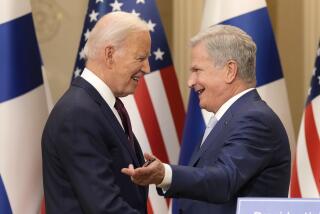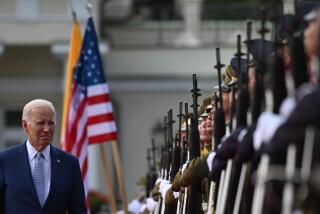NEWS ANALYSIS : Cautious Washington Stance on Baltics Sparks Criticism : Policy: Republic leaders and their American supporters are growing impatient. The U.S. had long championed independence.
WASHINGTON — For more than 50 years, the United States has championed the cause of Baltic independence, steadfastly refusing to acknowledge the annexation of Estonia, Latvia and Lithuania by the Soviet Union and granting their representatives the sort of diplomatic presence they were denied by much of the rest of the world.
But with victory for Baltic nationalists now seemingly assured, Washington is holding back--reluctant to expand the twilight diplomatic status of the three tiny republics to full recognition until they work out the details of an orderly separation with the Soviet government.
While President Bush ponders the arcane rules of sovereignty, more than a dozen countries have declared their recognition of Baltic independence and moved to establish full diplomatic relations with the three republics or announced their intention to do so.
Although Bush and other Administration officials now concede that the process of Baltic independence is “inexorable,” they insist that the United States will do nothing to contribute to the political collapse of the Soviet Union. In effect, Bush is reluctant to add to the daunting difficulties facing Soviet President Mikhail S. Gorbachev.
“What’s important is the reality of this thing--that they have their independence, but in a peaceful way and in a way which assures stability with their neighbors in the future,” Deputy Secretary of State Lawrence S. Eagleburger said in an interview with CBS. “It’s coming very fast, and everybody ought to relax. It’ll come and we’ll recognize it at the appropriate time.”
But that pace is far too slow for the leaders of the Baltic republics and their supporters in the United States. Sen. Donald W. Riegle Jr. (D-Mich.), joined by a bipartisan group of 14 other senators, called on Bush to act quickly.
“Mr. President, the United States at your direction led the international coalition favoring a restoration of constitutional rule in the Soviet Union,” the senators wrote. “We strongly urge that the United States seize this moment in history and promptly extend official diplomatic recognition to Lithuania, Latvia and Estonia.”
“The Administration has been timid on the Baltics for some time,” Riegle said in a telephone interview. “The only interpretation that I can give is that they don’t want to crowd Gorbachev. The time to get it done is now. The Baltics have been waiting for half a century to regain their independence.”
Ernst Jaakson, chief of Estonia’s diplomatic mission in the United States, stopped short of criticizing the Administration but did not disguise his impatience.
“We are looking forward to the complete restoration of Estonian independence and its recognition by the Western World,” Jaakson said. “The United States has been very good in this respect. It has never recognized the annexation of the Baltic states, and we deeply appreciate that. How it handles the present situation, is, of course, up to Washington. But there are many countries that already have announced that they will recognize the present regime in Estonia.”
Estonia, Latvia and Lithuania have enjoyed national independence for just 22 years in their history, which goes back more than 1,000 years. After about 200 years of rule by czarist Russia, the Baltic states were ceded to Germany during the closing days of World War I. With the defeat of Germany, they declared independence in 1918.
When Soviet dictator Josef Stalin and Nazi dictator Adolf Hitler secretly divided Europe between them in 1939, the Baltics were awarded to Moscow. In 1940, the three republics were forcibly incorporated into the Soviet Union.
The United States never enjoyed normal diplomatic relations with the Baltic states although a U.S. diplomat below the rank of ambassador represented Washington in the three republics from 1922 until 1940. For most of that period, the same envoy was accredited to all three states.
Although the United States closed its diplomatic mission in 1940, it permitted Estonia, Latvia and Lithuania to maintain their legations in the United States, extending normal diplomatic courtesies to the envoys. Many Western nations took the same stand in 1940 but over time, most of the Baltic missions outside the United States were closed.
The fast pace of events in the Baltics has caught Bush and several of his Cabinet members in seeming conflict with each other--a rare occurrence in an Administration that has been more successful than most in muting internal disagreements.
The differences are mostly on points of detail, but they reflect the issues that Bush and his aides are debating as they scramble to devise a U.S. policy.
Bush cautiously put his emphasis on the conditions that still must be met before he will treat the Baltics as independent states: “There are some very complicated formulae that have to be evolved here. They are very complicated situations because of the dependence at this moment in history of some of the Baltic states, for example, on the center.”
Secretary of State James A. Baker III and Defense Secretary Dick Cheney, on the other hand, emphasized how quickly they expect U.S. recognition of the Baltics’ independence to come.
Times staff writer Doyle McManus contributed to this report.
Where the Republics Stand on Independence
Declaring outright independence:
* Estonia
* Latvia
* Lithuania
* Byelorussia
* Georgia
* Ukraine
Getting closer:
* Moldova: President Mircea Snegur said Moldova will declare independence today. A parliamentary session is being held today.
* Armenia: It is scheduled to vote on independence from the Soviet Union on Sept. 21. The republic has a strong independence movement.
* Uzbekistan: President Islam Karimov instructed the Parliament on Monday to work out a draft bill on independence as soon as possible.
On the sidelines:
* Azerbaijan: It will hold its first popular election for president Sept. 8. Declared sovereignty in September, 1989, meaning that its laws take precedence over those of the central government on its territory.
* Kazakhstan: Declared sovereignty in October, 1990. The legislature amended the constitution Sunday to broaden the republic’s economic independence.
* Kirghizia: Declared sovereignty in December, 1990, the last of the 15 republics to do so.
* Tadzhikistan: Declared sovereignty in August, 1990. Has banned Communist Party cells in its law enforcement agencies, courts, justice and interior ministries.
* Turkmenistan: Declared sovereignty in August, 1990.
The biggest republic:
* Russia: While it has not separated, President Boris N. Yeltsin’s decrees in effect have made it operate independently of the central government. Russia’s huge territory is home to half the Soviet population.
Source: Times Wire Serices
Recognizing the Baltics
Here is a list of moves toward diplomatic relations with the Baltic republics of Estonia, Latvia and Lithuania: Argentina: Moving to form ties but no date set.
Austria: Says it will recognize Baltics if other European nations do.
Belgium: Sent ambassadors to make preliminary contacts.
Britain: Will establish ties when Moscow recognizes independence.
Bulgaria: First former Soviet Bloc country to recognize Baltic independence.
Canada: Announced Monday it is establishing diplomatic relations.
Czechoslovakia: Recognition expected Thursday.
Denmark: Sent Otto Borch, the first ambassador to the Baltic states in 50 years, to Latvia on Monday.
European Community: Foreign ministers meet today to discuss action.
Finland: Recognition planned when Baltic leaders reach accord with Moscow.
France: Sent envoy to Lithuania on Monday for talks before recognition.
Germany: Foreign Minister Hans-Dietrich Genscher invited Baltic foreign ministers to Bonn today to discuss diplomatic ties.
Hungary: Government will ask Parliament to approve recognition.
Iceland: On Monday, it became first country to sign agreements establishing relations with Baltics.
Italy: Plans to recognize Baltics.
Japan: Supports independence and will establish ties.
Malta: Recognized Baltic independence on Monday.
Norway: Announced Sunday it was forming ties.
Poland: Says it’s ready for ties but no date set.
Romania: Ready to establish ties.
Sweden: Expects to recognize Baltic independence today.
United States: President Bush said U.S. is “moving very, very close” to diplomatic recognition but some questions remain.
Vatican: Will reopen diplomatic offices in Baltics as soon as possible.
Source: Times Wire Services
More to Read
Sign up for Essential California
The most important California stories and recommendations in your inbox every morning.
You may occasionally receive promotional content from the Los Angeles Times.










